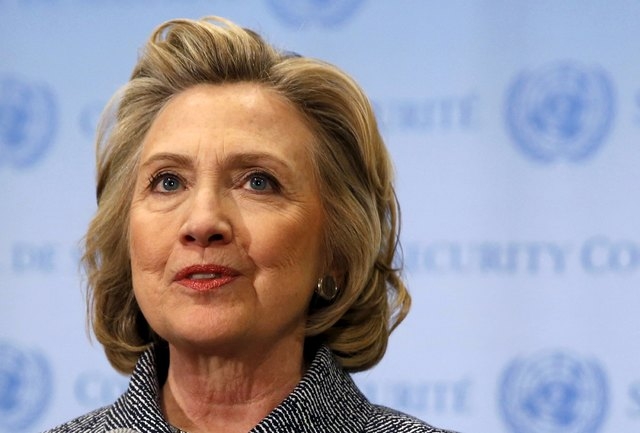Is Hillary Clinton the Democrats’ Mitt Romney?
Hillary Clinton officially announced her candidacy for president Sunday, immediately receiving both praise and backlash from both sides of the political spectrum.
Because of her global profile and the lack of other prominent Democrats in the field, the former first lady, Senator and Secretary of State enters the race in a position that is perhaps unmatched in modern U.S. presidential politics.
However, the path she’s on has striking similarities to another potential candidate who has already noted he has no intention of running: Mitt Romney.
1. Repeat runners
Clinton, who’s running for the second time in 2016 just like Romney was in 2012, has been a target for Republican criticism since Bill Clinton’s first presidential campaign. She came into the public spotlight after accusations arose in 1992 that her husband had had an affair, and again in 1998 with White House intern Monica Lewinsky.
In 2012, Romney won nearly half of the popular vote at 47 percent, but fell short on the electoral vote with 38 percent, in his second attempt at the presidency.
His 2008 campaign ended in February of that year. “Because I love America, in this time of war, I feel I have to stand aside for our party and our country,” he said.
2. Popular with the public
Huffington Post’s pollster shows a recent declining trend in Hillary’s popularity, but overall, she’s been favorable since 2009. Clinton resonated with female voters in 2012, as well as those Democrats with Bill still fresh in their minds.
As a businessman, Romney was favored and created an admirable line of success whose time in Massachusetts was never noteworthy enough to be counted against him.
A November poll found Republican voters were ready for a familiar face, giving Romney 19 percent of their support, with the next highest candidate, Florida Gov. Jeb Bush, 11 percent. Despite that, Romney didn’t feel like he should run a third time.
3. But opposed within their own party
In 2012 Mitt Romney became the face of Republicans in the U.S. While he wasn’t as nationally known previous to his announcement to run as Clinton is, Romney faced the same issue Hillary does today: the split of the party they’re meant to represent.
Clinton’s most notable controversy was the response to the attacks on the U.S. mission in Benghazi, Libya on Sept. 11, 2012. More recently, she came under fire for using her personal email address to conduct U.S. State Department business.
In the weeks leading up to Clinton’s Sunday announcement, Facebook groups such as Democrats Against Hillary Clinton in 2016 have recirculated a 2014 article in which she reaffirms her defense in a 1975 rape trial.
Progressives are unsure of Clinton’s positions on “a litany of current policy issues,” according to Al Jazeera English.
“It’s just on so many important society-shaping issues we don’t know where she stands and we have a suspicion that she’d rather not say,” Roger Hickey, co-director of the progressive Campaign for America’s Future said.
While Romney resonated with the GOP for being a “by-the-books Republican,” members of the party who disliked him did so more for personality, not policy.
Like Hillary’s constant question-dodging leading to concerns from both sides, Romney’s “aloofness” and “elitism” put off Democrats as well as Republicans. Romney in his second campaign tripped over a line of gaffes and past controversies along the way.
But two months before the November election, his campaign torpedoed after his “47 percent” comment alienated Republican support.
When it came down to the wire, the way Romney handled himself had become an issue for voters. That “aloofness” created a veil between who Romney actually was and who he wanted the public to know as a political leader in his campaign for the presidency.
Toward the end of his campaign he became known to some degree for his wealth and Mormon faith, where very few outright hated him — they simply never found him completely trustworthy.
That same lack of trust is the polarizing issue Clinton faces as she enters the race for the 2016 election.
After her recent email scandal, an April 10 Bloomberg poll found that 53 percent agree she purposely withheld or deleted some, with 29 percent saying she was truthful. One-fourth of Democrats agreed to the former.
“It raises a huge character issue for me. It goes to whether I can literally trust her,” said Leake Little, a 54-year-old Democrat and poll respondent. “Her actions just don’t add up.”
4. Both seemed inevitable
Reports on Monday quickly assumed Clinton would be at the front of the race for Democrat nominee, if nothing else than for her history in U.S. politics.
According to a March Gallup poll, only 2 percent of Americans said they’ve never heard of her.
Many assumed and supported a third campaign for 2016, but in January Romney said while he’s “convinced that we could win the nomination … it would have been a difficult test and a hard fight.”
But, despite those similarities, it’s not a death sentence for Clinton. The difference is Romney was the leader of a not-very-strong pack of possible Republicans who ultimately knew he didn’t have the support to make it happen. There’s no one for the Democrats but Hillary, and whether that will play in her favor remains to be seen.
Contact Kristen DeSilva at 702-477-3895 or kdesilva@reviewjournal.com. Find her on Twitter: @kristendesilva
RELATED
Hillary Clinton announces she is running for president
Hillary stepping up her campaign in Nevada














